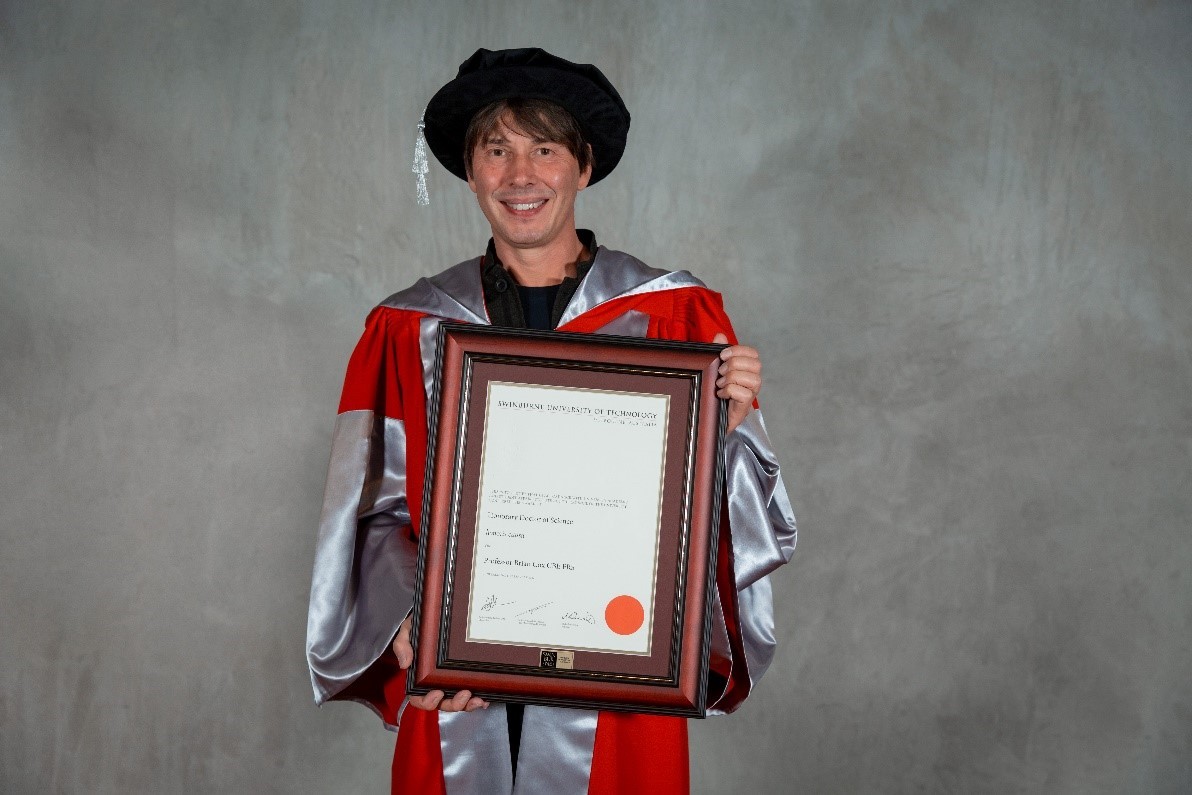Professor Brian Cox honoured at Swinburne

Professor Brian Cox was presented with his honorary doctorate in October.
In summary
- Swinburne has awarded world-renowned scientist Professor Brian Cox CBE FRS an honorary Doctor of Science
- This recognises his significant contribution as a global leader in communicating the world of astronomy, physics and astrophysics
- Professor Cox received his honorary doctorate in October and recorded a special message for graduating students
World renowned scientist Professor Brian Cox CBE FRS has been awarded an honorary Doctor of Science by Swinburne University of Technology in recognition of his significant contribution as a global leader in communicating the world of astronomy, physics and astrophysics.
Professor Cox was presented with his honorary doctorate by Swinburne Chancellor Professor John Pollaers and Swinburne Vice-Chancellor and President Professor Pascale Quester in October.
In a recorded message Professor Cox urged Swinburne's 2022 graduands to carry with them the values of Swinburne.
"It's not only to use your knowledge but it's to share your knowledge. It is vitally important that the ideas that you have been exposed to in whatever subject you've studied you try to spread out as widely as you can. So share the experience, the value of the experience that you have had," Professor Cox said.
Professor Cox rose to prominence as a member of British rock bands in the early 1990s before transitioning to work as an experimental physicist, exploring the cutting edge of particle physics.
He received his Doctorate in Physics from the University of Manchester, completing his thesis in 1998.
In 2005, he was appointed as a professor of particle physics at Manchester University, a position that he still holds.
As a broadcaster, he has presented highly acclaimed science programs for the British Broadcasting Corporation including Forces of Nature, Stargazing Live, The Planets and Wonders of the Solar System.
Professor Quester said Professor Cox is an excellent addition to the Swinburne community.
“Professor Cox is an esteemed global leader who embodies our vision of people and technology working together to build a better world.
“He has championed science globally and undertaken national speaking tours in Australia exploring the very latest in astrophysics and physics, with direct scientific connection to Swinburne’s Centre for Astrophysics and Supercomputing.
“One of Swinburne’s three flagship priorities is space and aerospace technology research and education into space technologies and their terrestrial applications, which aligns with Professor Cox’s research," Professor Quester said.

The university has recognised his significant contribution as a global leader in communicating the world of astronomy, physics and astrophysics to a diverse audience and inspiring generations to not only understand how the universe works but also to make better choices for our future.
-
Media Enquiries
Related articles
-

- University
- Education
Swinburne shines in 2025 QS World University Rankings by Subject
Swinburne University of Technology has achieved a total of 17 subjects ranked in the latest QS World University Rankings by Subject 2025.
Thursday 13 March 2025 -

- Astronomy
- Technology
- Science
Swinburne’s Spotlight on STEM: A Night of Space Innovation with Shelli Brunswick
Swinburne University hosted a Spotlight on STEM event with space innovator Shelli Brunswick, exploring space technology, leadership, and career opportunities in the space industry
Friday 21 March 2025 -

- Technology
- Education
- Science
- University
New Australia-India joint research institute to advance energy, communications, materials and manufacturing technologies
Swinburne University of Technology and the Indian Institute of Technology Hyderabad (IITH) have launched the Swinburne-IITH Manufacturing, Materials, Energy and Communication Technologies (SIMMECT) Joint Research Institute, to drive impactful research and global collaboration on major technology challenges.
Monday 03 March 2025 -

- Health
- Science
Swinburne to boost AI-driven design for dental devices with investment in H3D
Swinburne has invested in spinout company H3D, a cutting-edge tech company that is reinventing custom-fit devices using AI and automation.
Monday 31 March 2025 -

- Science
- Sustainability
Swinburne joins global Green Steel Alliance to advance carbon-neutral ironmaking and steelmaking
Swinburne has become a founding member of the global Green Steel Alliance. The Green Steel Alliance brings together leading research and industry stakeholders from around the world to advance the transition to a green economy.
Wednesday 12 March 2025

